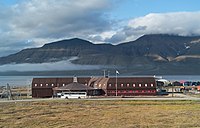University Centre in Svalbard
| Universitetssenteret på Svalbard AS | |
 
|
|
| Type | Limited company |
|---|---|
| Established | 1993 |
| Director | Harald Ellingsen |
|
Administrative staff
|
45 |
| Students | 690 (2015) |
| 20 | |
| Location | Longyearbyen, Svalbard, Norway |
| Tuition Fees | de facto 580 Kroner |
| Affiliations | University of the Arctic |
| Website | www.unis.no |
 |
|
The University Centre in Svalbard (Norwegian: Universitetssenteret på Svalbard AS; UNIS) is a Norwegian state-owned limited company that is involved in research and provides some university-level education in Arctic studies. The company is wholly owned by the Ministry of Education and Research, and the universities of Oslo, Bergen, Tromsø, NTNU and NMBU appoint the board of directors. It is led by a director appointed by the board for a four-year term. The centre is the world’s northernmost research and higher education institution, in Longyearbyen at 78° N latitude. The courses offered fall into four main science disciplines: Arctic biology, Arctic geology, Arctic geophysics and Arctic technology.
The centre was established in 1993 in Longyearbyen, a town of 2,100 inhabitants on the western coast of Spitsbergen island. Despite its name, it is not a university (a status that can only be conferred by the government under certain conditions to larger institutions), but a limited company involved in research and some university-level education. The main idea behind establishing UNIS was that the unique geographic location of the island permits the study of Arctic sciences in situ, right outside the company walls. Its official language is Norwegian, but English is used in all tuition and 68% of its 690 students originate from outside Norway (in 2015, foreign students came from 43 countries). Of the international students, the largest groups were from Nordic countries outside Norway (12%), Germany (11%), the Netherlands (9%), the United Kingdom (6%), and Russia (6%). The tuition is free of charge and is carried out by 27 full-time professors, 43 adunct professors and 160 guest lecturers. The latter are invited from Norwegian and foreign institutions within various joint research projects. Those projects are also instrumental for the enrollment of master and PhD students – UNIS does not accept its own graduates for those courses and requires potential candidates to present a letter of support from their home institution. One important collaboration is the educational exchange program with Russia. The funding for UNIS is provided by the Norwegian government, research councils and private industry.
...
Wikipedia
